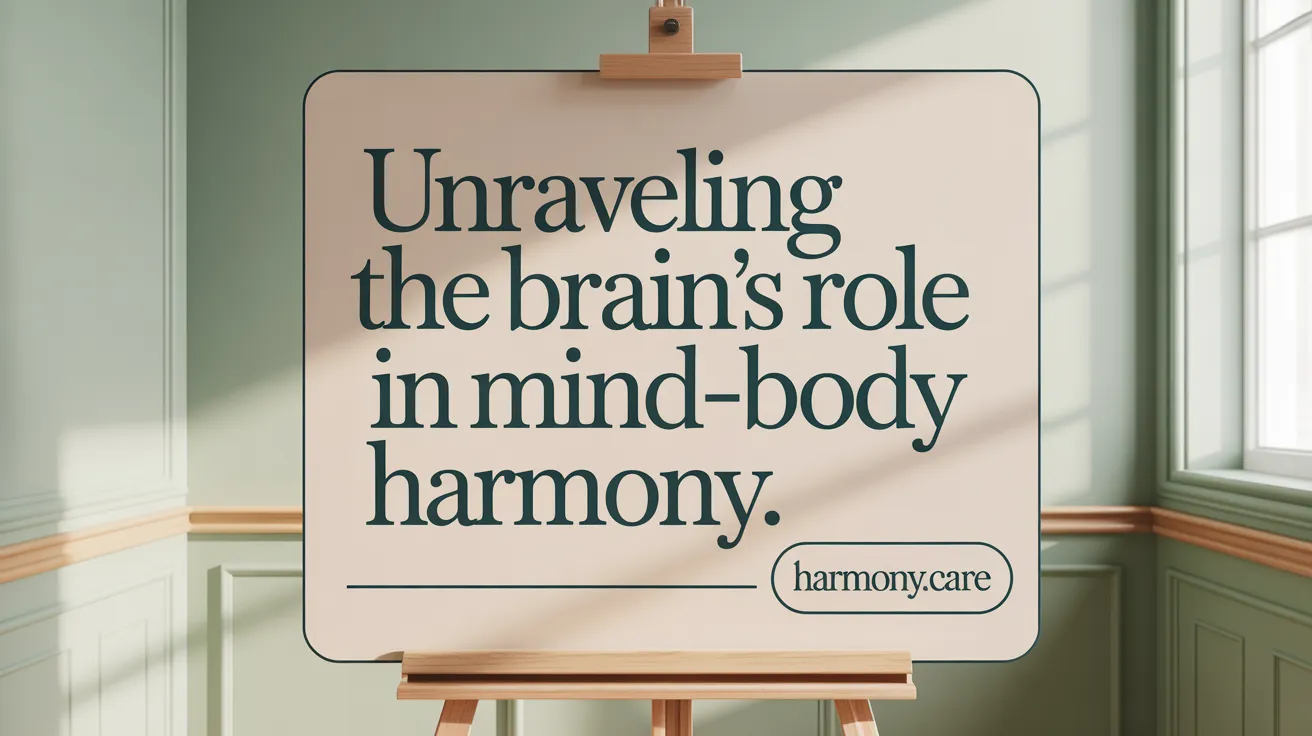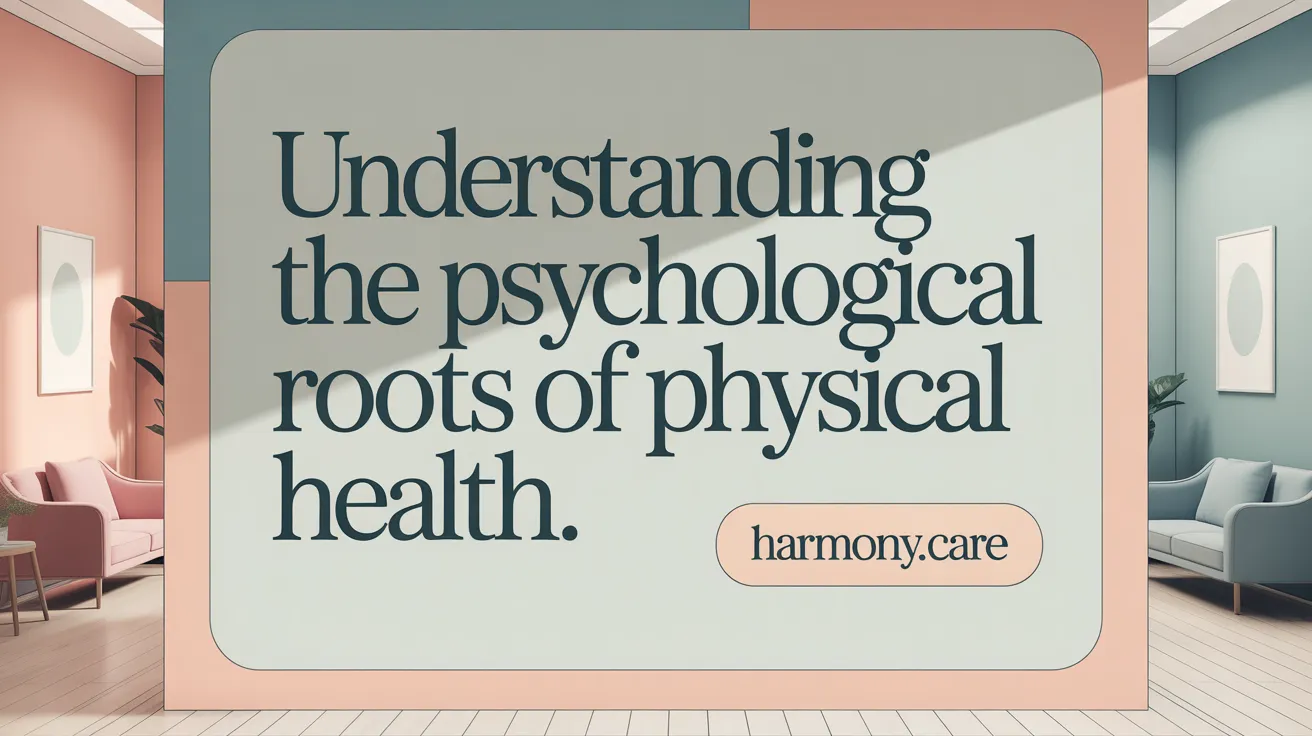Introduction to the Mind-Body Link
The mind-body connection refers to the profound relationship between mental and emotional states and physical health. Historically recognized in ancient Greek philosophy and traditional Chinese medicine, this interconnection has gained substantial scientific validation through modern neuroscience, psychoneuroimmunology, and behavioral medicine. This article unpacks the scientific basis, historical evolution, health benefits, and therapeutic practices that underscore the integral nature of the mind and body in health and healing.
The Scientific Foundations and Mechanisms of the Mind-Body Connection

What is the scientific basis and mechanism behind the mind-body connection?
The understanding of the mind-body connection is grounded in the intricate network of neural pathways within the brain that coordinate movement, cognition, and involuntary physiological processes. Modern neuroimaging research, including studies using fMRI and PET scans, has revealed the existence of specialized neural networks that integrate physical movement with emotional and cognitive regulation.
One such network, called the Somato-Cognitive Action Network (SCAN), dynamically develops from infancy through adulthood and connects regions responsible for motor control with areas involved in mental and autonomic regulation. This neural pathway involves key brain structures such as the anterior cingulate cortex (ACC), insular cortex, amygdala, and hippocampus, which are central in managing emotional responses, body awareness, and autonomic functions. The ACC, in particular, plays a crucial role in emotional regulation and decision-making, while the insula processes interoceptive signals related to body states.
Practices like meditation, yoga, tai chi, and Qigong influence these neural circuits by promoting parasympathetic nervous system engagement, which counters the stress response triggered by sympathetic activation. These techniques enhance body awareness, regulate stress hormones like cortisol and adrenaline, and improve emotional resilience. Moreover, embodiment exercises emphasize movement and physical awareness as means to bolster cognitive flexibility and emotional stability.
The interaction between movement-related neural pathways and those governing internal organ regulation demonstrates how psychological states can directly influence bodily functions. This is further supported by evidence that mind-body interventions can lead to measurable changes in brain activity, hormone levels, and immune responses. Overall, the neural architecture underpinning the mind-body connection provides a scientific explanation for how mental and physical health are deeply intertwined through brain structures and autonomic regulation pathways.
Historical Perspectives and Modern Scientific Developments
 The understanding of the mind-body connection has evolved significantly over centuries, blending ancient philosophies with recent scientific discoveries.
The understanding of the mind-body connection has evolved significantly over centuries, blending ancient philosophies with recent scientific discoveries.
Ancient Greece and Asian traditions laid foundational ideas by emphasizing the holistic nature of health. Philosophers like Plato and Aristotle on mind and body considered the mind and body as interconnected, and traditional Chinese medicine introduced concepts such as Qi, underscoring the essential unity of mental and physical health. These cultures recognized that emotional states and spiritual well-being influence physical health, using practices like acupuncture and meditation to promote harmony.
During the Renaissance, Western thinking began to shift with the development of dualism, notably through René Descartes mind-body theory, who famously distinguished between mind and body as separate entities. This division influenced much of Western medical thought for centuries, often leading toward a mechanistic approach that focused primarily on biological aspects while overlooking mental and emotional factors.
However, the 19th and 20th centuries saw the emergence of psychosomatic medicine history, which started exploring how psychological factors like stress and emotions directly affect physical health. Innovations in psychology and physiology demonstrated that emotional and mental states activate neural, hormonal, and immune pathways that impact various bodily systems.
Modern scientific models have further advanced our comprehension of this complex interplay. Frameworks such as the biopsychosocial model integrate biological, psychological, and social determinants of health, acknowledging that mental, emotional, and social factors are integral to understanding disease development and recovery. Likewise, the field of psychoneuroimmunology findings has provided empirical evidence that stress and emotional states influence immune responses, highlighting mechanisms through which mind influences body.
Despite historical conflicts with biomedical models rooted in Cartesian dualism, contemporary medicine increasingly recognizes that mental and physical health are deeply interconnected. This integrated perspective supports holistic therapies for mind-body health, including meditation, cognitive-behavioral therapy, and relaxation techniques as valuable tools in preventing and treating illnesses. The shift from a dualistic view to a biopsychosocial approach reflects a more comprehensive understanding of human health, emphasizing the importance of nurturing mental, emotional, and social well-being alongside physical care.
Research continues to explore the neural pathways and biochemical mechanisms behind this connection. For example, the discovery of brain networks that link movement, emotion, and physiological regulation (such as the Somato-Cognitive Action Network) underscores the neural basis for integrated health practices. Overall, the journey from ancient holistic ideas through a period of scientific skepticism to today's supported, interdisciplinary framework demonstrates an ongoing transition toward recognizing the profound unity of mind and body in fostering health and healing.
Health Benefits and Therapeutic Mind-Body Practices
The mind–body connection provides a wide range of health benefits by promoting self-awareness, emotional regulation, and resilience. Engaging in practices such as mindfulness, yoga, deep breathing, and meditation can significantly reduce stress levels, foster mental clarity, and improve sleep quality. Scientific research has shown that when the mind influences physical processes, it can lead to lower blood pressure, a stronger immune response, and better pain management.
Common therapies harnessing this connection include meditation, yoga, tai chi, Qigong, acupuncture, massage therapy, guided imagery, aromatherapy, and relaxation techniques. These modalities are designed to stimulate the brain-body interaction, encouraging relaxation and reducing symptoms related to anxiety, depression, musculoskeletal pain, and fatigue. Supported by scientific evidence, many of these practices are safe and accessible, often conducted by trained professionals or through self-care routines.
The effectiveness of mind-body interventions is well-documented in symptom management and chronic illness care. They have been shown to improve mental health, reduce inflammation, and enhance overall well-being. For example, meditation and yoga help activate the relaxation response, counteracting the stress response and improving emotional health.
In summary, strengthening the mind–body relationship through these practices not only alleviates symptoms but also boosts resilience, promotes healing, and enhances quality of life. As understanding and acceptance grow, incorporating such therapies into healthcare strategies continues to expand, offering holistic support for physical and mental health.
Psychological Influences on Physical Health and Psychosomatic Disorders

How do psychological factors influence physical health conditions?
Psychological factors such as stress, anxiety, depression, and maladaptive coping behaviors can significantly influence physical health conditions by affecting biological processes, treatment adherence, and symptom perception. These mental states can trigger physiological responses like increased production of stress hormones such as cortisol and adrenaline, which over time may lead to inflammation, immune suppression, and cardiovascular issues (Psychosomatic disorder overview, Psychological factors in heart disease risk).
Chronic stress and negative emotions are linked to the worsening of health outcomes, including accelerated progression of illnesses like heart disease, diabetes, and chronic pain syndromes. Conversely, positive mental states, mindfulness, and relaxation techniques can bolster immune function and promote healing (impact of emotional states on health, positive emotions and immune function).
Moreover, psychological factors impact health behaviors—such as diet, exercise, sleep, and medication compliance—that are crucial in managing chronic diseases. Poor psychological well-being often correlates with less engagement in health-promoting behaviors, resulting in increased hospitalizations and healthcare costs (Mind-Body Connection: Mental and Emotional Health, exercise reduces depression and anxiety).
The biopsychosocial model highlights that health is the result of complex interactions between biological, psychological, and social factors. Assessment of patients often includes mental health screenings and evaluation of functional capacity (biopsychosocial model, Biopsychosocial model of psychosomatic disorders).
Effective treatment of psychosomatic aspects involves psychotherapy, stress management strategies, and behavioral interventions that target mental and emotional well-being to positively influence physical health. These approaches aim not only to reduce symptoms but also to improve overall quality of life, emphasizing the importance of addressing mental health as a vital component of physical health care (Psychotherapy for stress management, Mind-body therapies for mental health, Relaxation and health improvement).
Lifestyle, Environment, and Holistic Approaches Supporting Mind-Body Health
 Supporting the profound connection between mental and physical health involves a combination of lifestyle choices, environmental influences, and holistic practices. Regular physical activity, such as yoga, tai chi, and aerobic exercises, enhances both physical and mental resilience by releasing endorphins, reducing stress hormones like cortisol, and improving mood and cognitive function. A nutrient-dense diet, exemplified by the Mediterranean diet rich in fruits, vegetables, lean proteins, and healthy fats, contributes to brain health and emotional stability, while limiting processed foods high in sugars and refined flours helps mitigate inflammation and metabolic disruptions.
Supporting the profound connection between mental and physical health involves a combination of lifestyle choices, environmental influences, and holistic practices. Regular physical activity, such as yoga, tai chi, and aerobic exercises, enhances both physical and mental resilience by releasing endorphins, reducing stress hormones like cortisol, and improving mood and cognitive function. A nutrient-dense diet, exemplified by the Mediterranean diet rich in fruits, vegetables, lean proteins, and healthy fats, contributes to brain health and emotional stability, while limiting processed foods high in sugars and refined flours helps mitigate inflammation and metabolic disruptions.
Sleep quality is fundamental for restoring energy and supporting emotional regulation, with adequate rest proven to decrease anxiety and improve overall health. Social connections also play a vital role, providing emotional support, reducing feelings of loneliness, and fostering resilience against stress-related illnesses.
In the realm of holistic health, core principles include treating the whole person—mind, body, and spirit—rather than merely alleviating symptoms. Integrative therapies, such as acupuncture, guided imagery, nutritional guidance, and mind-body practices like meditation and biofeedback, are combined with conventional medicine to promote balance and healing. These approaches recognize the body’s innate ability to restore health when given appropriate support.
Environmental factors significantly influence this system. Exposure to natural environments, such as forest-bathing or walks in nature, activates relaxation pathways, diminishes stress, and boosts immune function. Managing chronic stress and creating a nurturing environment are crucial to preventing physiological imbalances that can impair mental health.
Empowerment of individuals through personalized care is central to holistic health paradigms. Educating patients about their health, encouraging active participation, and tailoring interventions—such as lifestyle modifications—foster resilience and self-efficacy.
Furthermore, complementary therapies—including herbal remedies, massage, energy healing, and spiritual practices—align with holistic principles by addressing emotional, spiritual, and physical needs, thereby supporting overall wellness. These practices can reduce tension, promote relaxation, and foster a sense of harmony between body and mind.
Collectively, embracing a lifestyle that integrates healthy habits, environmental awareness, and holistic therapies builds a robust foundation for nurturing the mind-body connection, facilitating comprehensive well-being and resilience.
The Role of Mind-Body Interventions in Healthcare and Future Directions

How has the mind-body connection influenced healthcare and holistic medicine approaches?
The understanding of the mind-body connection has revolutionized healthcare by fostering a more integrative and patient-centered approach. Recognized for centuries across cultures—from ancient Greece to traditional Chinese medicine—this connection highlights that mental, emotional, and spiritual health significantly impact physical well-being. Modern neuroscience and psychoneuroimmunology have provided scientific evidence showing that mental states influence bodily functions, such as immune response, hormone regulation, and inflammation. Practices like meditation, yoga, and mindfulness induce neurobiological, physiological, and genomic changes that promote relaxation and reduce stress-related health risks. Integrating mind-body therapies into conventional healthcare enhances resilience, improves outcomes in chronic illness, reduces medication reliance, and lowers healthcare costs. Moreover, emphasizing emotional and spiritual well-being encourages holistic, values-driven care, ultimately fostering a greater sense of autonomy, purpose, and recovery in patients.
What evidence supports the effectiveness of mind-body interventions in disease management?
Accumulating clinical evidence underscores the benefits of mind-body interventions across various health conditions. Meta-analyses reveal that practices such as mindfulness meditation, yoga, tai chi, and guided imagery effectively alleviate anxiety, depression, and stress—comparable to pharmacological or cognitive-behavioral treatments. Neuroimaging studies demonstrate that these practices activate brain regions involved in self-regulation, attention, and emotion control, while biological research shows they modulate immune activity and reduce stress hormones like cortisol. For instance, yoga and tai chi have improved balance, mobility, and emotional health in chronic pain and cardiovascular diseases. Randomized controlled trials indicate these therapies can decrease symptom perception, enhance quality of life, and support emotional resilience, making them valuable adjuncts to traditional medical approaches. Despite the promising data, ongoing research with rigorous controlled designs is essential for fully establishing their role in standard care.
How are mind-body strategies applied in managing conditions like anxiety, depression, pain, and cancer care?
Mind-body strategies target the complex mind-body interaction to alleviate symptoms and improve overall health. In anxiety and depression, mindfulness meditation, and yoga help regulate brain activity, decrease physiological stress responses, and foster acceptance. Patients report reductions in worry, emotional distress, and physical tension. In pain management, techniques like guided imagery, hypnosis, and biofeedback alter brain activity and modulate pain perception, often reducing opioid use and improving function. For cancer patients, mind-body practices support emotional coping, reduce treatment-related fatigue, and boost immune function. Incorporating these methods into clinical practice involves trained practitioners and personalized treatment plans. They promote relaxation, improve emotional resilience, and contribute to a holistic recovery process—complementing conventional treatments and emphasizing patient empowerment.
What are recent research advancements in psychosomatic medicine and behavioral health related to mind-body integration?
Recent developments emphasize the neurobiological mechanisms underpinning mind-body interactions. Research in psychosomatic medicine reveals that practices like meditation and yoga activate specific brain regions, increase heart rate variability, and suppress inflammatory pathways, thereby reducing chronic stress and related disorders. Advances in neuroimaging have mapped neural networks involved in the relaxation response, pain modulation, and emotional regulation, validating traditional practices scientifically. The integration of behavioral therapy with physiological interventions—such as neurofeedback and mitochondrial medicine—enhances personalized care. Interdisciplinary efforts continue to explore how cultural and spiritual factors influence mind-body health, recognizing their role in resilience and healing. Ongoing research aims to clarify optimal dosing, identify predictors of benefit, and develop cost-effective models suitable for broad clinical application, thus advancing the reach and efficacy of holistic health strategies.
Conclusion: Embracing the Mind-Body Connection for Holistic Health
Understanding and embracing the mind-body connection offers a transformative approach to health and healing. Grounded in robust scientific evidence and enriched by historical wisdom, this interconnection shapes how mental and emotional states influence physical well-being. Integrative mind-body practices not only alleviate symptoms and improve quality of life across numerous conditions but also empower individuals to participate actively in their health journey. As healthcare continues to evolve, incorporating mind-body strategies holds promise for more comprehensive, compassionate, and effective care. Ultimately, nurturing the harmony between mind and body is essential for promoting resilience, preventing disease, and achieving holistic wellness.
